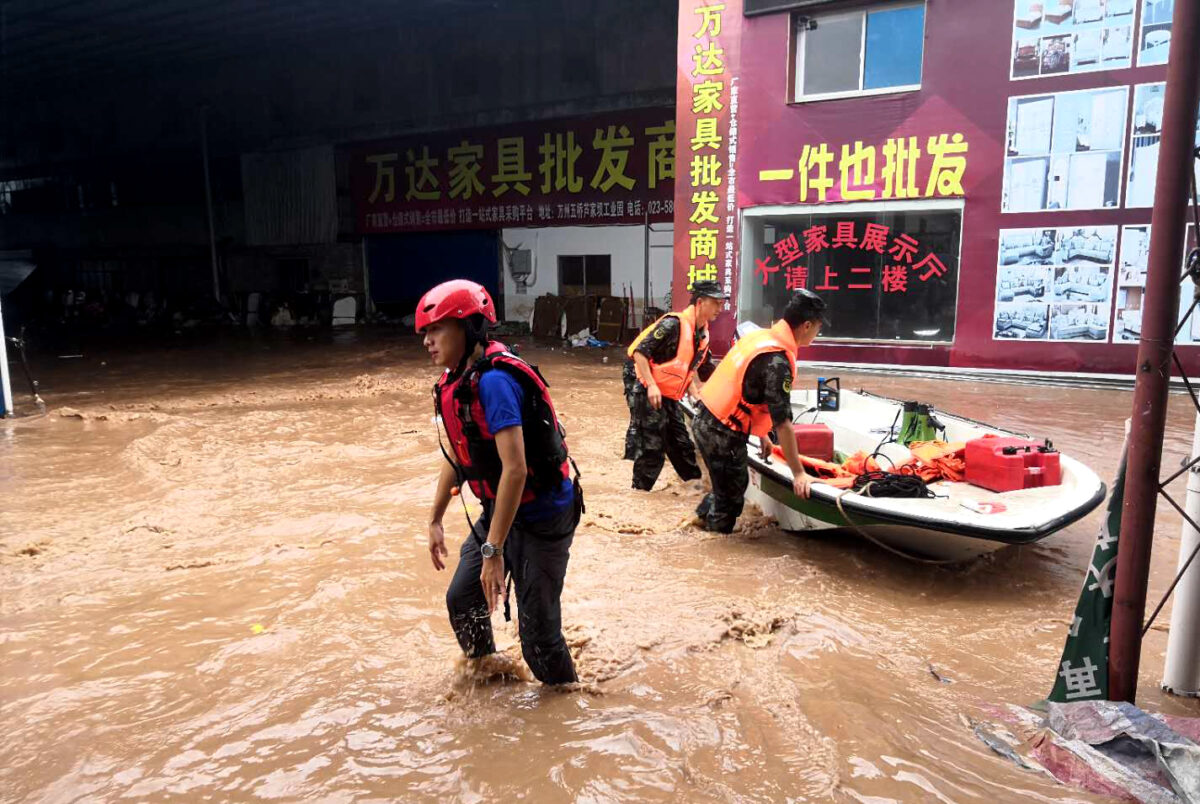In the sprawling expanse of southern China, multiple days of relentless rainfall have plunged the region into chaos. The once vibrant landscapes now lie submerged beneath murky floodwaters, as deadly torrents sweep through villages and towns, leaving destruction and despair in their wake. At the heart of this unfolding tragedy is Guangdong province, an economic powerhouse and home to over 127 million people. Here, the relentless deluge has forced more than 110,000 individuals to flee their homes, seeking refuge from the rising waters that threaten to upend their lives.
The toll of this disaster is measured not only in human lives lost but also in the shattered remnants of homes and livelihoods. A rescue worker among the casualties, the floods have claimed at least four lives in Guangdong, with many more still missing. Entire communities find themselves submerged beneath the floodwaters, their streets transformed into rushing torrents, their homes reduced to debris. Aerial footage and social media posts offer glimpses into the scale of devastation, with villages engulfed and streets turned into rivers.
Yet, behind this tragic spectacle lies a deeper, more ominous truth: the looming shadow of the climate crisis. Scientists warn that the intensification of extreme weather events, such as the torrential rains and severe floods witnessed in the Pearl River Delta, is a direct consequence of global warming. The once-predictable rhythms of nature have been disrupted, as rising temperatures fuel more frequent and more severe weather patterns. What was once considered a once-in-a-century event now threatens to become the new norm.
The Pearl River basin, subject to annual flooding from April to September, has borne the brunt of this onslaught. As climate change exacerbates existing vulnerabilities, communities find themselves increasingly ill-equipped to cope with the mounting challenges. Landslides near Shaoguan city in the province’s mountainous north further compound the crisis, injuring six people and adding to the tally of human suffering.
As the floodwaters continue to rise, authorities have raised the flood control emergency response for the Pearl River Delta to level 2 – the second-highest in a four-tier system. Schools have been suspended, flights canceled, and cities brought to a standstill as residents brace themselves for the worst. The economic toll is equally staggering, with more than 80 houses collapsed or severely damaged, resulting in a direct economic loss of nearly 140 million yuan ($20 million).
Yet, even as the immediate emergency demands swift action, the floods serve as a sobering reminder of the urgent need for long-term solutions. The climate crisis, once a distant threat, now looms large on the horizon, demanding attention and action on a global scale. In the face of mounting evidence and escalating disasters, the time for decisive action is now.
In Guangdong, as in many parts of the world, the events unfolding serve as a somber wake-up call. The time for denial and complacency has long passed. It is imperative that governments, communities, and individuals alike come together to address the root causes of climate change and build resilience in the face of its impacts. From investing in infrastructure to adapting agricultural practices, from reducing greenhouse gas emissions to preparing for more frequent extreme weather events, the solutions are complex but necessary.
As the people of southern China brace themselves for further rainfall and the prospect of more flooding in the days ahead, the events unfolding in Guangdong serve as a stark reminder of the stakes at hand. The choices we make today will shape the world we leave for future generations. The time for action is now, lest we condemn ourselves and our planet to an uncertain and perilous future.




1 Comment
Pingback: Devastating Floods in Brazil's Rio Grande do Sul - INPAC Times